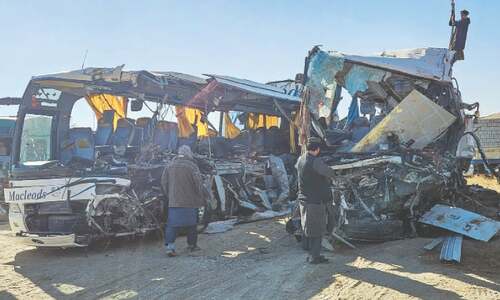
Haashiay Par Likhi Nazmein
By Salman Haider
Maktaba-e-Danyal, Karachi
ISBN: 978-9694191072
172pp.
If each word is an idea that makes you think, then ‘haashiaa’ [margin] is a very interesting word to think about. It conjures up the margins around an image, the borderlines of a picture, the peripheries of a human settlement and — perhaps most significant of all — the marginalised people in society.
For Salman Haider, the people sitting on the margins are the ones who bear most of the burden of society. His new collection, Haashiay Par Likhi Nazmein [Poems Written on the Margins] is about those who refuse to sit on the sidelines even when the dominant forces in society do not let them cross the limiting boundaries enforced upon them.
So who are these people who do not want to be on the peripheries? They are those who disappear mysteriously, who are tortured by unidentified state officials, who lose their lives for daring to dissent from the state narrative, whose mutilated bodies are found after their mysterious deaths at the hands of unknown people.
Haider brings these people into the mainstream, through poems describing their trials and tribulations. His expression is vivid, but not simple, and reveals the complexities of state repression that is not lenient on people.
Salman Haider’s verses shine a glaring light on the repression that the state doesn’t want people to talk about
In a society where ethical and legal standards are at the mercy of those who can bend laws and violate moral codes, resistance is perhaps the only option. And Haider fully utilises that option in his expression and his politics. Being a political activist in Pakistan, who underwent abduction and torture and finally had to flee the country, made him even stauncher in his resistance against coercion. Despite living so far away, he keeps a close eye on nearly all developments in his home country and vents his anger through his poems.
Haider comes out as a thinker who is fully aware of how the world around him is transforming rapidly, but his own people remain fossilised in a never-changing rigmarole. Their very survival as activists and communicators is at risk; they can’t speak their minds and, if they try to, a hammer or a sword is hanging over their heads. Haider’s creativity is impressive and strikes a chord with anyone who is conscious of the plight of fellow citizens.
The 85 poems in Haider’s book take up the challenge of breaking some set patterns in poetry and they succeed by conveying the inner feelings of those on the receiving end of state repression. Consider ‘Yeh Marsiya Nahin Hai’ [This is Not an Elegy]:
[I have disappeared without a trace/ And my friends/ Are waiting for my death/ Sipping their tea/ Thinking about my qualities/ They will highlight in my elegy/ I was a pious man/ Never protested/ It is below the dignity of a writer/ In protests, they raise slogans/ Which is not literature/ The government deems it insolence/ Anyway, I have penned three and a half poems/ For the 50 who disappeared]
This is the side of Pakistan that the state does not want people to talk about, nor does it consider it worthy of attention if state functionaries abduct and remove any trace of those who are ‘undesirable’.
There are families who have been waiting for their loved ones for years, but the state does not feel any responsibility to respond to their queries. Haider gives expression to all those families in which children have grown up and parents have died while nursing a hope to see, once more, the one close to their heart. In ‘Aankhon Se Behti Dua’ [A Prayer Dripping from the Eyes] he writes:
[Searching for his father/ He had reached the age for disappearance/ He spent his childhood on paths/ That bind settlements with wilderness/ As if they were prisoners tied together/ The air he was breathing/ Heaved sighs with him/ And the mountains, echoed his wails/ Wilderness sent its dread with him/ That walked faster than him/ Reached markets ahead of him/ And he, with his wheelbarrow/ Carried his prayers, and of his friends/ From town to town]
This is the agony that many in this country go through, but cannot talk about. This dread is morbid and one must have a fairly strong heart to imagine the pains of imposed separation.
In ‘Khurdurri Zindagi’ [Uneven Life], Haider writes:
[Mufflers around our necks/ Strangling our throats; get tangled in an overgrown, uneven shave/ Our eyeballs, behind closed eyelids/ Move anxiously, waiting for death/ Throats dried up, rehearsing for the last gasp/ Hangers, for the black robes of our mourners/ We have designed with the remaining wood of the coffin]
Since Haider himself has endured this sort of torture, he is more than anxious to share his own ordeal with his readers. Not one to shy away from the consequences of his expression of resistance, he paints a picture that isn’t easy to look at. He draws his margins with blood and sweat and writes with a disturbing courage, because he wants his readers to have at least an idea of what being a victim is like.
Haider’s poems make you wince and shiver with the same current that victims have endured. He does not hesitate to question the state narrative; in fact, he exposes it in all its ugliness. Take the poem ‘Somvaar Kabhi Nahin Aata’ [Monday Never Comes]:
[I want to engrave my name on a tree, or on the sky/ Or in the rain, or on the wings of a bird/ Even a star would do the trick/ But these are not, in an approved list of names/ I want to advertise for my name change/ That happens only on a Monday/ As the clerk says/ I must choose/ A sword or an axe/ A rope, or a bow/ Or the gallows/ He suggests the gallows/ That, too, is made from a tree/ But I don’t agree]
Nearly all poems in the book are a reflection of our society today. That is the dark side of a story untold. But the telling takes place, Haider does the job well and makes us think about the ones who find themselves on the margins.
*All translations are by the reviewer
The reviewer is a columnist and educator based in Islamabad. He tweets @NaazirMahmood and can be reached at mnazir1964@yahoo.co.uk
Published in Dawn, Books & Authors, July 31st, 2022













































Dear visitor, the comments section is undergoing an overhaul and will return soon.